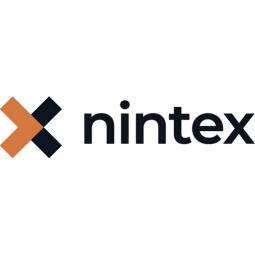Download PDF

Nintex
Overview
HQ Location
United States
Year Founded
2006
Company Type
Private
Revenue
$100m-1b
Employees
201 - 1,000
Website
Company Description
Nintex is the global standard for process management and automation. Today more than 10,000 public
and private sector organizations across 90 countries turn to the Nintex Platform to accelerate progress on
their digital transformation journeys by quickly and easily managing, automating and optimizing business
processes.
and private sector organizations across 90 countries turn to the Nintex Platform to accelerate progress on
their digital transformation journeys by quickly and easily managing, automating and optimizing business
processes.
IoT Solutions
Nintex, the maker of award-winning business productivity software and SaaS offerings, enables enterprise IT professionals and business analysts to more easily create and manage simple to sophisticated business processes from the back to front-office. From automating workflows and forms, to document generation, the Nintex Workflow Automation platform leverages the world’s largest technology ecosystems including Office 365, Salesforce, SharePoint, and other enterprise services platforms
Key Customers
Amazon, ZOOM, Astrazeneca, Nationwide
IoT Snapshot
Nintex is a provider of Industrial IoT analytics and modeling technologies, and also active in the finance and insurance, healthcare and hospitals, metals, and renewable energy industries.
Technologies
Functional Areas
Industries
Services
Technology Stack
Nintex’s Technology Stack maps Nintex’s participation in the analytics and modeling IoT Technology stack.
-
Devices Layer
-
Edge Layer
-
Cloud Layer
-
Application Layer
-
Supporting Technologies
Technological Capability:
None
Minor
Moderate
Strong
Case Studies.

Case Study
ANZ Bank's Digital Transformation with Nintex Advanced Workflow
ANZ Bank, one of the top 50 banks in the world and the fastest-growing bank in Indonesia, was facing a challenge with its rapidly increasing transaction volume. The bank's existing business processes and workflow were becoming overwhelmed. Like most banks in Indonesia, ANZ was manually handling document submission and verification. Customers filled out paper loan applications and supporting documents, then delivered them to bank branches by mail or courier. Branch officers traveled to the bank’s headquarters or used postal mail, email, and phone calls to submit loan documents for verification. Lost or inaccurate documents created more emails and phone calls. Additionally, ANZ had to adhere to strict verification and financial regulations, including the Foreign Accounts Compliance Act. This act requires that all banks outside the United States provide key information about U.S. clients, including citizenship validation, to the Internal Revenue Service–a complex yet crucial process.

Case Study
Boosting Case Study Production by 300% with Nintex Drawloop DocGen for Salesforce
Strategic Growth, a top Salesforce Gold Consulting Partner in the US, was facing challenges with its case study production process. The process was slow, unreliable, and often failed to comply with the Salesforce template. After completing a Salesforce implementation for a client, a Strategic Growth consultant would manually fill out the case study slide template provided by Salesforce. This process was often delayed by weeks or months, and sometimes all relevant data was not captured. If consultants pasted data into a local template instead of downloading the latest one, additional time was required to recreate the case study in the correct format. The company was meeting Salesforce’s case study quota, but wanted to improve efficiency by eliminating these manual steps.

Case Study
Lippuner Digitally Transforms Paper-based Ordering Processes
Lippuner has nearly 350 employees across four cities. Each employee orders new phones every two years. Their marketing department generates about 450 orders per year across 41 different items—for a total of 18,450 orders. In the past, these orders were processed using paper forms, causing slowdowns and adding time to the process. These outdated processes didn’t comply with the company’s high standards of efficiency.





